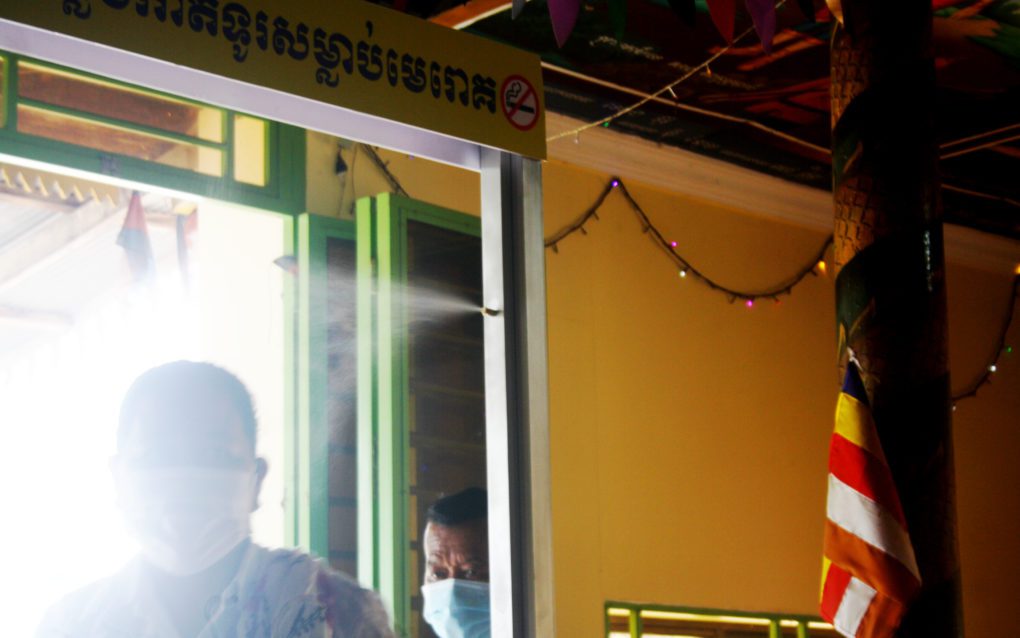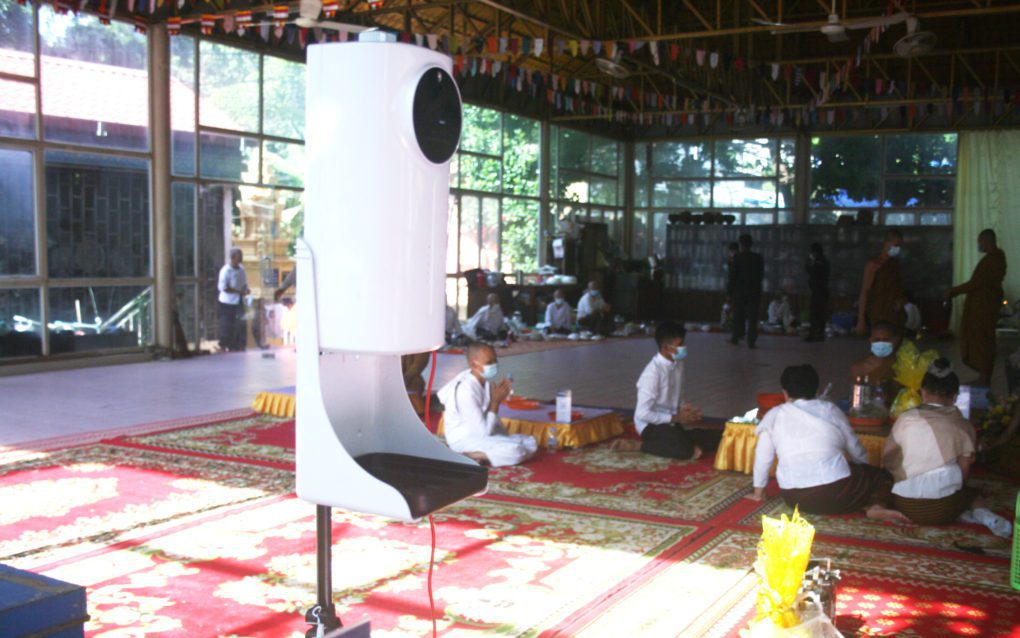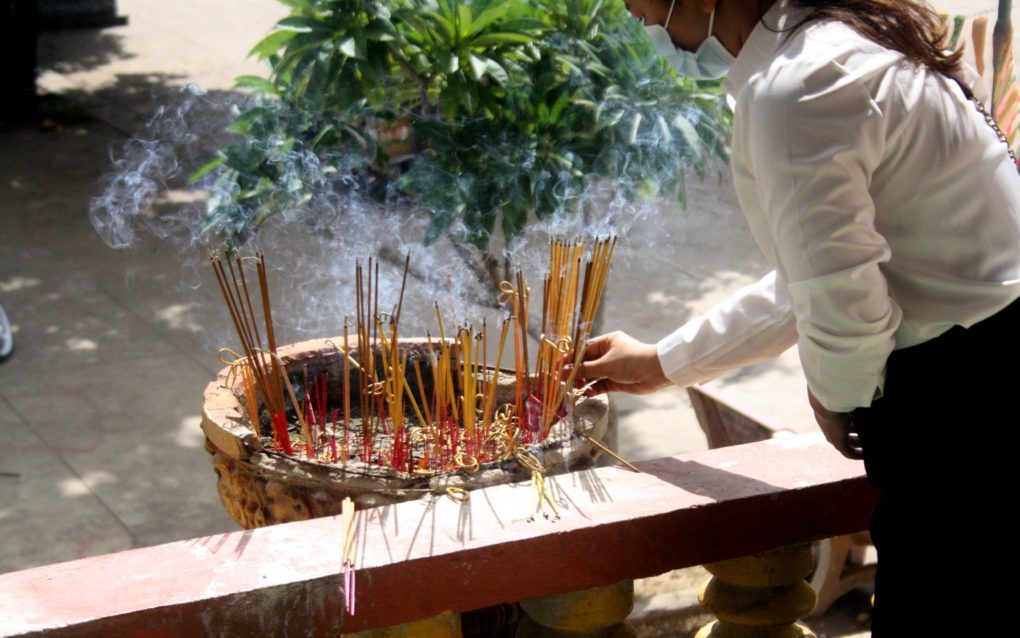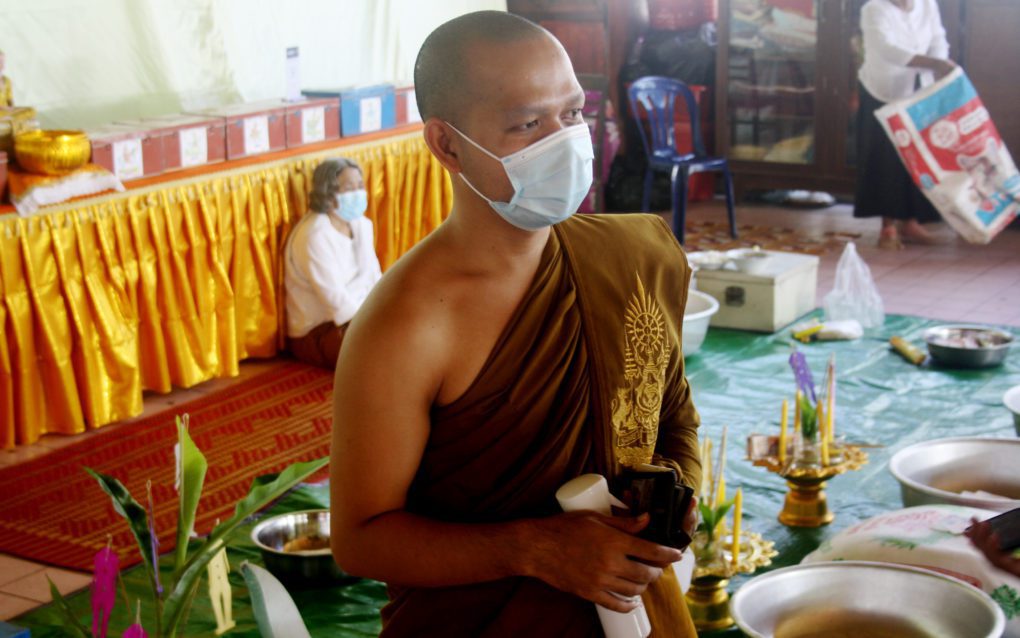On the first day of Pchum Ben, visitors to Wat Sovann Sakor in Kandal walk under a metal gate and are asked to spin around once as alcohol sprays over them.
Inside, people put rice into metal bowls as donations, as the chief monk gives blessings to those kneeling on the mats and praying. Achar, or lay priests, sit and chat among each other before lunch.
But mostly, people simply offer their rice and food to the monks and leave quickly.
Moum Chue, a nun, sits with around 10 women preparing desserts for the monks. They pass a white cloth between each other to clean plates, and arrange onsom cake and fruit.
Chue, speaking to a reporter on the first day of the holiday, says she is very happy about Pchum Ben’s arrival. It’s a long tradition and it is good to see people follow it, she says.
“People who come during Pchum Ben bring food, some money, especially onsom. I feel happy. Even though it’s Covid-19, it’s OK. We take precautions like wearing masks and using alcohol spray. This feels comfortable. Also, it is lucky that the government still allows Pchum Ben to happen.”
Last year, though Covid-19 case numbers were still low, the lack of crowds gave many a sense of disappointment.
Chea Phon, an 80-year-old achar at the pagoda, says the pagoda has temperature checks, full-body alcohol spray and will enforce social distancing. But there is no limit to how many people can enter, because visitors know to take precautions, he says.
“We do not have any limit for people to come inside the temple, because most of them just come and offer their stuff” without lingering, Phon says. “It seems they understand this situation.”


Houy Sithon, 50, who lives nearby, sits on a bench at the pagoda. She says she comes every year. For her, Covid-19 is still concerning, but following the tradition is more important.
“This year Pchun Ben is different. I’m still in fear of infection,” she says. Last year she was worried too, but the Delta variant is now on her mind. “This is the tradition for Pchum Ben. I was determined to come to this pagoda for my relatives who have passed away.”
The tradition of Pchum Ben involves hungry ancestor spirits — with the 15-day holiday the only chance in the year to receive food. If their relatives don’t come to the pagoda, they will go away with an empty stomach.
“They don’t stay long in the pagoda. Me too. I just offered the rice and got the blessing from the monk, and I came down,” Sithon says. “When it’s not Covid, I always eat lunch at the pagoda.”
Though she still has concerns, many Covid-19 habits, like wearing a mask, have just become normal life, she adds.
In Phnom Penh’s Svay Pope pagoda, several police officers are stationed around the compound at 8 in the morning.
Mony Chat Tith, a senior monk there, says the pagoda has put a limit of five people giving offerings at one time.
“We put the authorities and some students who are staying here to help the pagoda arrange the duties as well. The environment in the pagoda hasn’t had many people coming yet in the morning, but it might be at lunchtime,” Chat Tith says.
Though there are many precautions in place, the day feels relatively normal despite Covid-19, he says.


Chan Thy, a 51-year-old beverage seller, also says it doesn’t feel too different now. She adds that Pchum Ben gives her the opportunity for some extra work.
“During Pchum Ben, I wash the dishes. So I can get around $10 to $15 each day from the monks,” Thy says.
At Wat Preah Youvong nearby, a village guard stands at the gate checking people’s temperatures. He reminds people to use alcohol spray and keep a distance from one another.
Seng Somony, spokesperson for the Religion Ministry, says even the authorities’ presence is to be expected.
“The authorities just help during Pchum Ben, like every year. They just help to take care of the cars and motorbikes of the Buddhist people,” Somony says.
Officers at all levels, from the village, commune and district, can help if there are any crowds, he adds.
“If there are too many people, there will be many police officers to help the pagoda.”
At Wat Moha Montrey, monk Mao Duong Soudina says there are fewer people than in a usual year, but it’s still a celebration.
“For me, as usual, as every year, the Buddhists come to give food,” he says. “Of course there’s a risk, but it’s also good to celebrate the festival since it is a time to dedicate food to the ancestors.”
Everyone has concerns about Covid-19, but people have learned to manage them for the most part, he says.
“If we consider it, most of the people have gotten a vaccination. In other words, the cases in Phnom Penh are reduced,” he says. “Both worshippers and monks understand how to protect themselves since they always bring masks, alcohol and keep a social distance. … They implement the principles carefully, which makes me happy to see that.”
“Now things are starting to return back,” Duong Soudina adds. “We can celebrate the ceremony, we can go to the pagoda just by implementing the three dos and three don’ts.”












